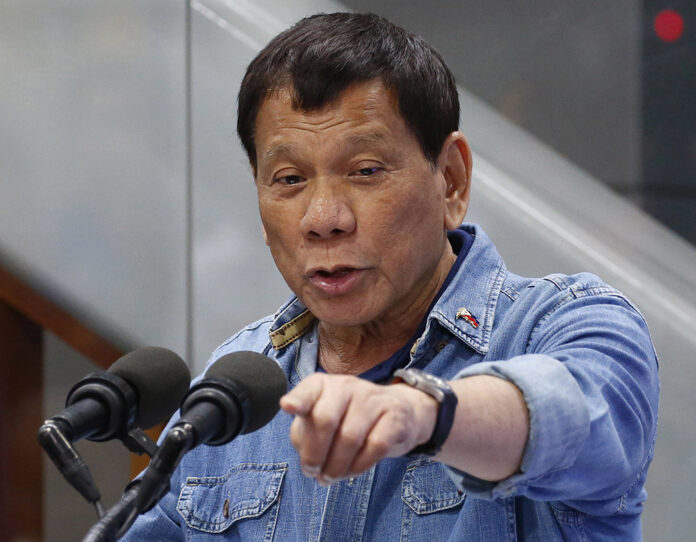
President Rodrigo R. Duterte called for reforms in the United Nations (UN) to help address global crises and injustices.
In his pre-recorded video statement during the High Level Debate of the 76th Session of the UN General Assembly (UNGA) last Wednesday, Philippine standard time, Duterte admonished the UN, particularly its security council, for its lack of transparency and respect to democratic principles.
“Democracy and transparency are concepts that reverberate in the halls of the UN. But ironically, the security council–the pinnacle of your structure–violates every tenet of these values,” Duterte said.
The UN Security Council currently has 15 members. Of which, five–China, France, Russia, United Kingdom, and the United States of America–are permanent members.
The non-permanent members, which are elected every two years, are Estonia, India, Ireland, Kenya, Mexico, Niger, Norway, Saint Vincent and the Grenadines, Tunisia, and Vietnam.
The council has power to issue binding resolutions among UN members countries, which could be vetoed by the five permanent members,
Duterte said the scheme “no longer reflects the political and economic realities of the world” and should be changed for the UN to effectively govern.
“If the UN is to lead the world in its many crises we face, things need to change. The UN must empower itself by reforming itself. Therein lies the hope of humanity,” Duterte said.
Vaccine hoarding
Foremost of the said crisis, Duterte said, is the ongoing “hoarding” by some developed countries of life-saving novel coronavirus disease (Covid-19) vaccines.
He expressed shock at how some rich countries are now considering giving booster shots to its citizens while developing nations are stuck with vaccine shortages.
“This is shocking beyond belief and must be condemned for what it is–a selfish act that can neither be justified rationally nor morally,” Duterte said.
To ensure equitable distribution of vaccines, Duterte said the Philippine government committed US$1 million to UN’s Covax facility.
“The plain fact is–this pandemic will not end unless the virus is defeated everywhere. Vaccines are key to achieving this,” Duterte said.
Global injustice
Duterte also raised the issue of “injustice” caused by climate change to developing countries, which tend to suffer the most from it despite having the least contribution to its creation.
He said while developing countries are helping to bring down global carbon emissions, the said efforts “will be rendered useless if the biggest polluters–past and present–chose to do business as usual.”
“We, therefore, appeal for urgent climate actions especially for those who could truly tip the balance. Developed countries must perform their long-standing commitment to climate financing, technology transfer, and capacity building in the developing world. This is a moral obligation that cannot be avoided,” Duterte said.
Resolving climate change, he said, should not be “at the expense of developing countries’ economic vitality.”
Kafala abolition
During his speech, Duterte also called for the abolition of “structures that allow exploitations and abuse of migrant workers, including the Kafala system.
Kafala is a practice in most Middle East nations wherein a migrant worker is required to get a sponsor before they could work in the said countries.
The scheme is prone to abuse since the sponsors could exert unreasonable control on the movement and employment of migrant workers.
“Nothing could justify the continued existence of this unjust system. While reforms have been made, the Kafala system must be dismantled sooner or later in the name of justice and basic decency,” Duterte said.
Drug war
Duterte also briefly discussed his administration’s efforts in holding accountable government uniformed personnel, who may have violated the law, in their campaign against illegal drugs.
“I have instructed the Department of Justice and the Philippine National Police to review the conduct of our campaign against illegal drugs. Those found to have acted beyond bounds during operations shall be made accountable before our laws,” Duterte said.
He said he is ready to cooperate with the United Nations as long as it will be in a “constructive engagement.”
“The imposition of one’s will over another–no matter how noble the intent– has never worked in the past and it never will in the future,” Duterte said.
To note, Duterte’s administration is currently facing an investigation from the International Criminal Court (ICC) for the killings of thousands of drug suspects.
Duterte repeatedly said he will not cooperate with the said ICC probe, which he sees as an attack on the country’s sovereignty.
Refugee aid
Duterte also appealed to UN member countries to assist refugees from countries, which are currently facing political turmoil.
Despite its limited resources, he said the country opened its doors to Afghan nationals, who fled Afghanistan after it was taken over by the Taliban earlier this year.
He said the country is currently coordinating with the UN High Commissioner for Refugees to help Rohingya refugees from Myanmar, which is currently suffering political upheaval.
“The Philippines has limited resources during these extraordinary times. But what we can do for humanity and to uplift human dignity, we will,” Duterte said.
International law
Last, Duterte also reiterated his position on how the 1982 UN Convention of the Law of the Sea (UNCLOS) and the 2016 arbitral award should be used to resolve the existing territorial dispute in the South China Sea.
“The award must be seen for what it is–a benefit across the world to all those who subscribe to the majesty of the law,” Duterte said.
“No amount of blatant disregard of any country no matter how big and powerful can diminish the Arbitral Awards’ importance,” he added.
Among the countries with existing claims in the area are the Philippines, Taiwan, Indonesia, Malaysia, Vietnam, and China.
The Arbitral award, which favored the Philippines, effectively nullified the nine-dash line introduced by China to claim parts of the South China sea.
The 76th UNGA, which was attended by representatives of 193 member states, was held in a hybrid format of in-person and virtual attendance due to the pandemic.
Image courtesy of AP/Bullit Marquez
Read full article on BusinessMirror



